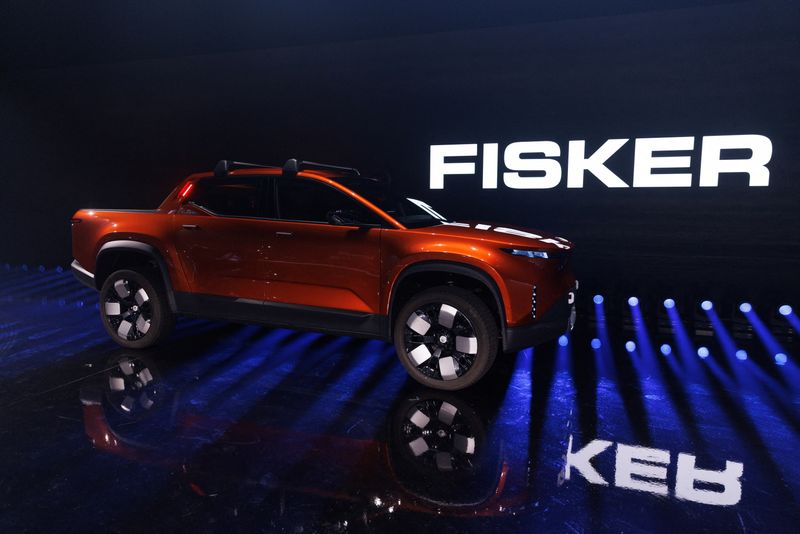2/2

© Reuters. Electric car company Fisker shows off its Alaska pickup truck in Huntington Beach, California, August 3, 2023. REUTERS/Mike Blake/File Photo
2/2
FSR
-0.65%
Add to/Remove from Watchlist
Add to Watchlist
Add Position
Position added successfully to:
Please name your holdings portfolio
Type:
BUY
SELL
Date:
Amount:
Price
Point Value:
Leverage:
1:1
1:10
1:25
1:50
1:100
1:200
1:400
1:500
1:1000
Commission:
Create New Watchlist
Create
Create a new holdings portfolio
Add
Create
+ Add another position
Close
By Zaheer Kachwala and Abhirup Roy
(Reuters) -EV startup Fisker (NYSE:FSR) warned on Thursday it might not be able to continue as a going concern and its shares tumbled 35% after the stock market closed.
Fisker said it would cut its workforce by about 15% and added it was in talks with a large automaker for a potential investment and joint development partnership. It did not disclose the name of the automaker or financials of the potential deal.
The company has struggled to sell its flagship Ocean electric SUV after high interest rates have led to a slowdown in demand. Current resources were “insufficient” to cover the next 12 months, Fisker said. In addition to talks with the large automaker, Fisker said it was in talks with a debt holder about a potential investment. Fisker said it aims to deliver between 20,000 and 22,000 Ocean vehicles in 2024. Without additional financing, the company said it might be forced to reduce production of Ocean, decrease investments, scale back operations and cut jobs further.
Fisker’s commentary followed disappointing production forecasts from larger peers Rivian (NASDAQ:RIVN) and Lucid (NASDAQ:LCID) as high borrowing costs have soured consumer sentiment and sharply slowed demand for EVs that are typically more expensive than gasoline-powered vehicles.
“2023 was a challenging year for Fisker, including delays with suppliers and other issues that prevented us from delivering the Ocean SUV as quickly as we had expected,” CEO Henrik Fisker said.
The company has been grappling with delivering vehicles to customers. Though it made more than 10,000 vehicles in 2023 – less than a quarter of its initial forecast – it delivered only about 4,700.
Last month, Fisker said it would add dealerships alongside its direct-to-consumer distribution model to expand its delivery network. So far, Fisker has signed 13 dealer partners across the U.S. and Europe.
Fisker said its business plan was “highly dependent” on the successful transfer to the new dealer partner model this year.
The company has been in talks with five automakers over a partnership to secure additional production capacity, Fisker told Reuters late last year.
On Thursday, he said talks had narrowed down to one automaker and a deal would include joint development of one or more electric vehicle platforms, and North America manufacturing.
Many traditional automakers have been laggards in the EV race and a deal with a startup will help them leapfrog into the market.
“It saves time, saves cost and where we’ve been focusing on in talking to automakers is really to share the technology, the investments we’ve made,” the company’s finance chief Geeta Fisker said on the call.
Last year, Fisker unveiled a $45,000 electric pickup, Alaska, and a smaller SUV, PEAR, priced at $29,990. But the projects depend on the partnership.
“We are not planning to start external expenditure on our next projects until or we have a strategic partnership in place,” Henrik Fisker said on a post-earnings call with analysts.
On Thursday, Fisker reported preliminary revenue of $200.1 million for the fourth quarter, missing the average analyst estimate of $310.8 million, according to LSEG data. Net loss widened to $463.6 million from $170 million a year ago.
Source: Investing.com





























